Leadership and Management Analysis: Tesco's Strategic Development
VerifiedAdded on 2023/01/05
|12
|3449
|24
Report
AI Summary
This report provides a detailed analysis of leadership and management theories, including transactional and transformational approaches, within the context of a multinational company, Tesco. It explores classical leadership theories such as transactional, contingency, and situational leadership, as well as classical management theories like systems, bureaucratic, and scientific management. The report examines Tesco's mission, vision, and PESTLE and SWOT analyses to understand its strategic environment. Furthermore, it investigates the relationship between personality, motivation, and leadership, and their combined impact on organizational structure and employee performance. The report also discusses the importance of understanding competitive strategy in the current business scenario, with a focus on leadership and management's role in achieving it.
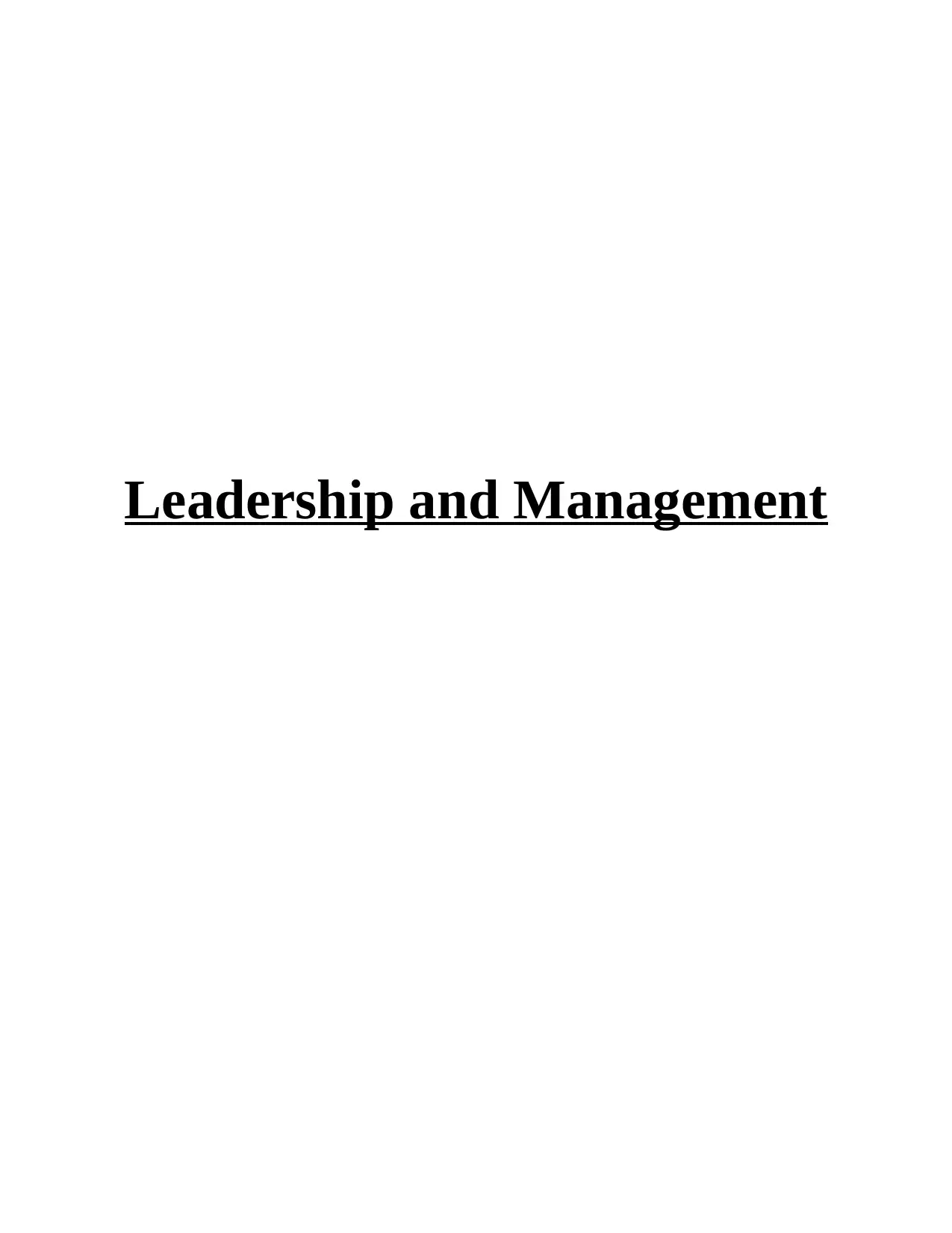
Leadership and Management
Paraphrase This Document
Need a fresh take? Get an instant paraphrase of this document with our AI Paraphraser
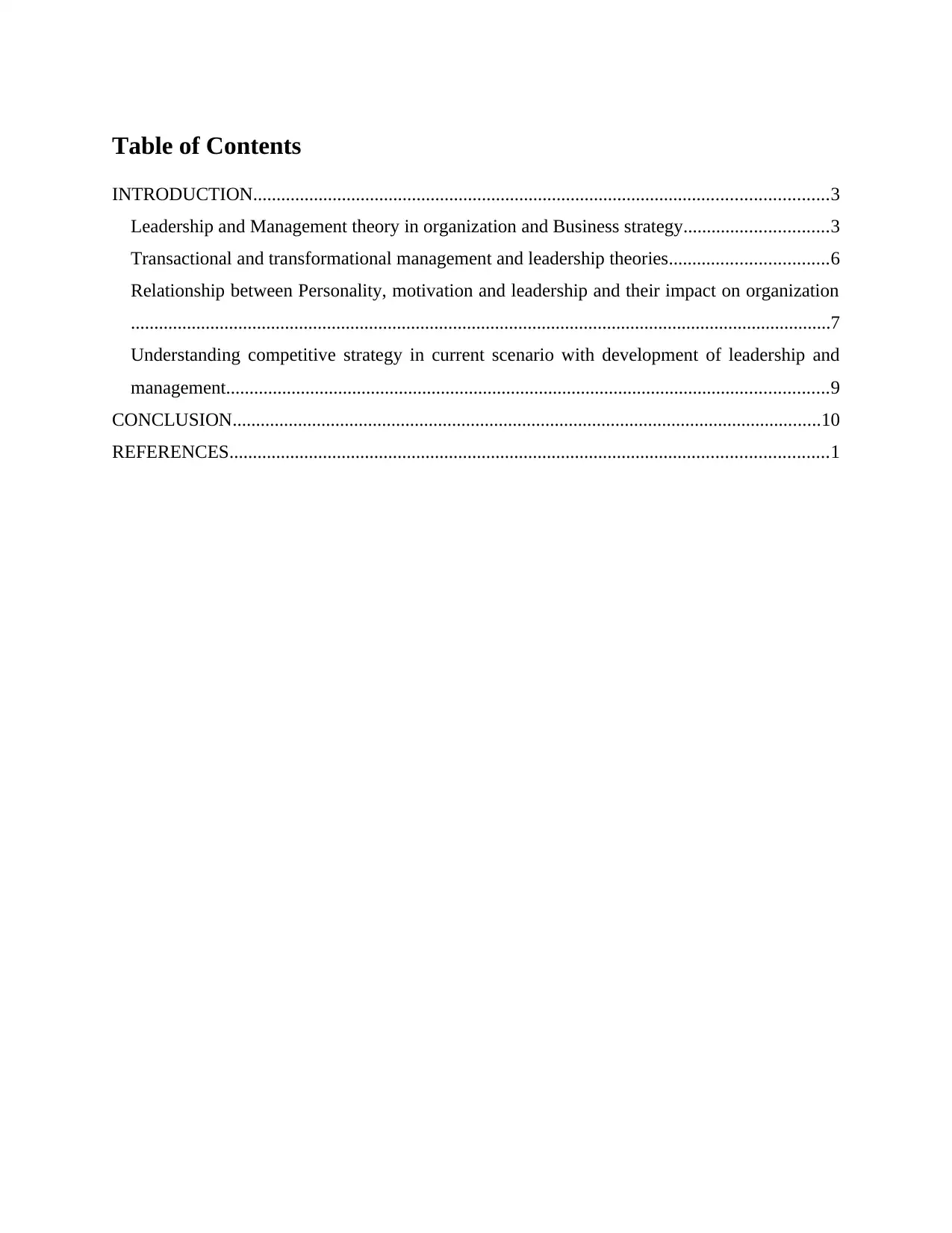
Table of Contents
INTRODUCTION...........................................................................................................................3
Leadership and Management theory in organization and Business strategy...............................3
Transactional and transformational management and leadership theories..................................6
Relationship between Personality, motivation and leadership and their impact on organization
......................................................................................................................................................7
Understanding competitive strategy in current scenario with development of leadership and
management.................................................................................................................................9
CONCLUSION..............................................................................................................................10
REFERENCES................................................................................................................................1
INTRODUCTION...........................................................................................................................3
Leadership and Management theory in organization and Business strategy...............................3
Transactional and transformational management and leadership theories..................................6
Relationship between Personality, motivation and leadership and their impact on organization
......................................................................................................................................................7
Understanding competitive strategy in current scenario with development of leadership and
management.................................................................................................................................9
CONCLUSION..............................................................................................................................10
REFERENCES................................................................................................................................1
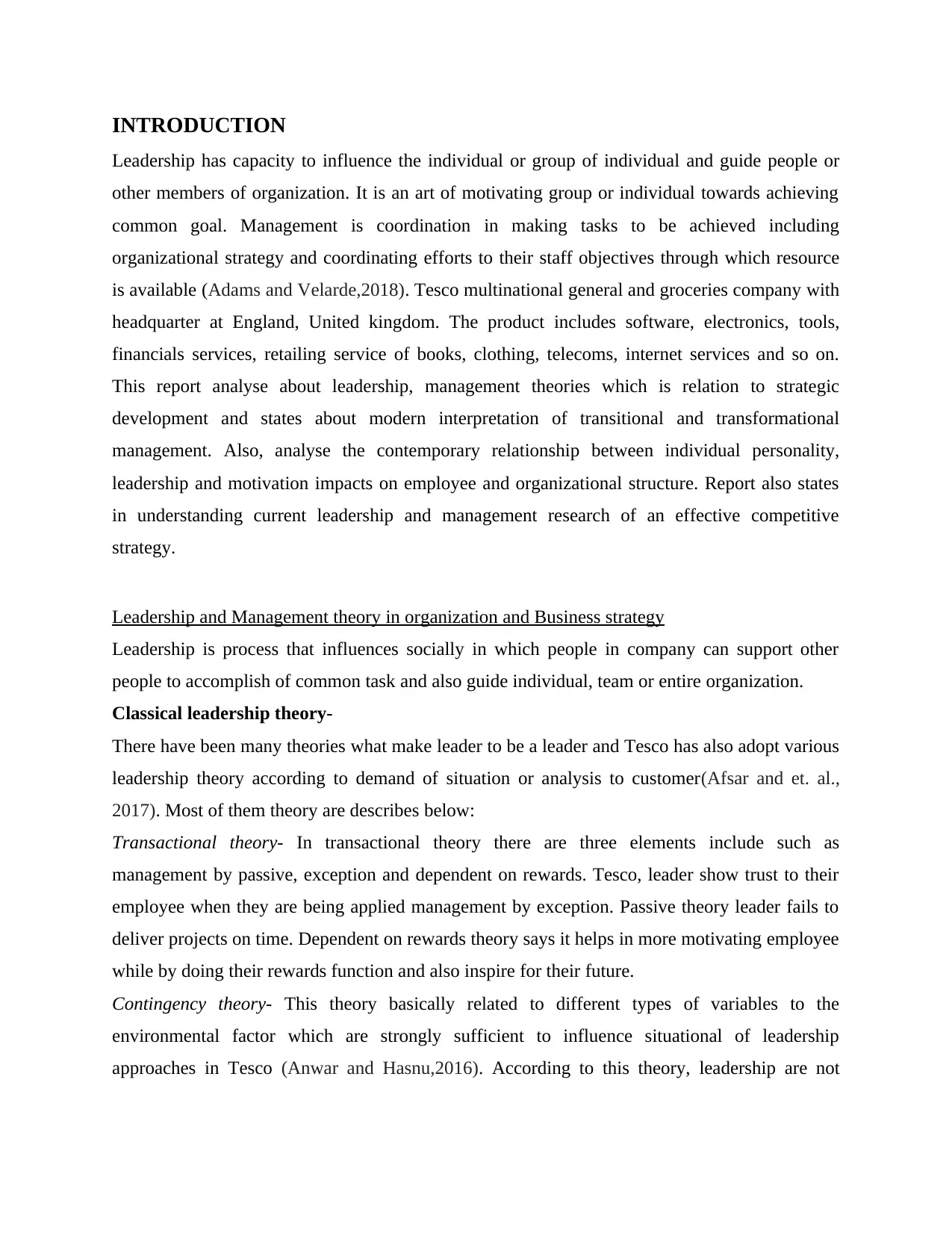
INTRODUCTION
Leadership has capacity to influence the individual or group of individual and guide people or
other members of organization. It is an art of motivating group or individual towards achieving
common goal. Management is coordination in making tasks to be achieved including
organizational strategy and coordinating efforts to their staff objectives through which resource
is available (Adams and Velarde,2018). Tesco multinational general and groceries company with
headquarter at England, United kingdom. The product includes software, electronics, tools,
financials services, retailing service of books, clothing, telecoms, internet services and so on.
This report analyse about leadership, management theories which is relation to strategic
development and states about modern interpretation of transitional and transformational
management. Also, analyse the contemporary relationship between individual personality,
leadership and motivation impacts on employee and organizational structure. Report also states
in understanding current leadership and management research of an effective competitive
strategy.
Leadership and Management theory in organization and Business strategy
Leadership is process that influences socially in which people in company can support other
people to accomplish of common task and also guide individual, team or entire organization.
Classical leadership theory-
There have been many theories what make leader to be a leader and Tesco has also adopt various
leadership theory according to demand of situation or analysis to customer(Afsar and et. al.,
2017). Most of them theory are describes below:
Transactional theory- In transactional theory there are three elements include such as
management by passive, exception and dependent on rewards. Tesco, leader show trust to their
employee when they are being applied management by exception. Passive theory leader fails to
deliver projects on time. Dependent on rewards theory says it helps in more motivating employee
while by doing their rewards function and also inspire for their future.
Contingency theory- This theory basically related to different types of variables to the
environmental factor which are strongly sufficient to influence situational of leadership
approaches in Tesco (Anwar and Hasnu,2016). According to this theory, leadership are not
Leadership has capacity to influence the individual or group of individual and guide people or
other members of organization. It is an art of motivating group or individual towards achieving
common goal. Management is coordination in making tasks to be achieved including
organizational strategy and coordinating efforts to their staff objectives through which resource
is available (Adams and Velarde,2018). Tesco multinational general and groceries company with
headquarter at England, United kingdom. The product includes software, electronics, tools,
financials services, retailing service of books, clothing, telecoms, internet services and so on.
This report analyse about leadership, management theories which is relation to strategic
development and states about modern interpretation of transitional and transformational
management. Also, analyse the contemporary relationship between individual personality,
leadership and motivation impacts on employee and organizational structure. Report also states
in understanding current leadership and management research of an effective competitive
strategy.
Leadership and Management theory in organization and Business strategy
Leadership is process that influences socially in which people in company can support other
people to accomplish of common task and also guide individual, team or entire organization.
Classical leadership theory-
There have been many theories what make leader to be a leader and Tesco has also adopt various
leadership theory according to demand of situation or analysis to customer(Afsar and et. al.,
2017). Most of them theory are describes below:
Transactional theory- In transactional theory there are three elements include such as
management by passive, exception and dependent on rewards. Tesco, leader show trust to their
employee when they are being applied management by exception. Passive theory leader fails to
deliver projects on time. Dependent on rewards theory says it helps in more motivating employee
while by doing their rewards function and also inspire for their future.
Contingency theory- This theory basically related to different types of variables to the
environmental factor which are strongly sufficient to influence situational of leadership
approaches in Tesco (Anwar and Hasnu,2016). According to this theory, leadership are not
⊘ This is a preview!⊘
Do you want full access?
Subscribe today to unlock all pages.

Trusted by 1+ million students worldwide
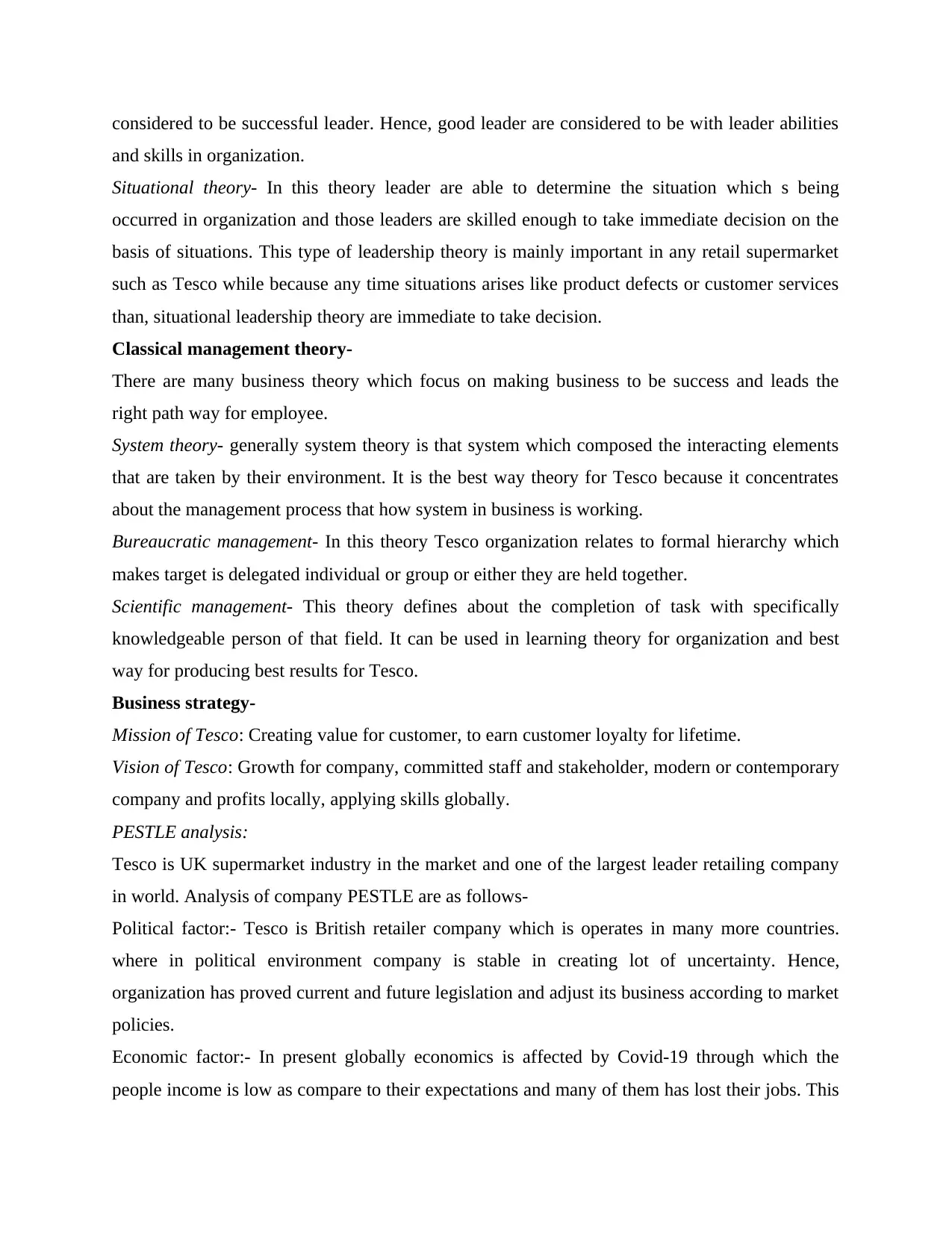
considered to be successful leader. Hence, good leader are considered to be with leader abilities
and skills in organization.
Situational theory- In this theory leader are able to determine the situation which s being
occurred in organization and those leaders are skilled enough to take immediate decision on the
basis of situations. This type of leadership theory is mainly important in any retail supermarket
such as Tesco while because any time situations arises like product defects or customer services
than, situational leadership theory are immediate to take decision.
Classical management theory-
There are many business theory which focus on making business to be success and leads the
right path way for employee.
System theory- generally system theory is that system which composed the interacting elements
that are taken by their environment. It is the best way theory for Tesco because it concentrates
about the management process that how system in business is working.
Bureaucratic management- In this theory Tesco organization relates to formal hierarchy which
makes target is delegated individual or group or either they are held together.
Scientific management- This theory defines about the completion of task with specifically
knowledgeable person of that field. It can be used in learning theory for organization and best
way for producing best results for Tesco.
Business strategy-
Mission of Tesco: Creating value for customer, to earn customer loyalty for lifetime.
Vision of Tesco: Growth for company, committed staff and stakeholder, modern or contemporary
company and profits locally, applying skills globally.
PESTLE analysis:
Tesco is UK supermarket industry in the market and one of the largest leader retailing company
in world. Analysis of company PESTLE are as follows-
Political factor:- Tesco is British retailer company which is operates in many more countries.
where in political environment company is stable in creating lot of uncertainty. Hence,
organization has proved current and future legislation and adjust its business according to market
policies.
Economic factor:- In present globally economics is affected by Covid-19 through which the
people income is low as compare to their expectations and many of them has lost their jobs. This
and skills in organization.
Situational theory- In this theory leader are able to determine the situation which s being
occurred in organization and those leaders are skilled enough to take immediate decision on the
basis of situations. This type of leadership theory is mainly important in any retail supermarket
such as Tesco while because any time situations arises like product defects or customer services
than, situational leadership theory are immediate to take decision.
Classical management theory-
There are many business theory which focus on making business to be success and leads the
right path way for employee.
System theory- generally system theory is that system which composed the interacting elements
that are taken by their environment. It is the best way theory for Tesco because it concentrates
about the management process that how system in business is working.
Bureaucratic management- In this theory Tesco organization relates to formal hierarchy which
makes target is delegated individual or group or either they are held together.
Scientific management- This theory defines about the completion of task with specifically
knowledgeable person of that field. It can be used in learning theory for organization and best
way for producing best results for Tesco.
Business strategy-
Mission of Tesco: Creating value for customer, to earn customer loyalty for lifetime.
Vision of Tesco: Growth for company, committed staff and stakeholder, modern or contemporary
company and profits locally, applying skills globally.
PESTLE analysis:
Tesco is UK supermarket industry in the market and one of the largest leader retailing company
in world. Analysis of company PESTLE are as follows-
Political factor:- Tesco is British retailer company which is operates in many more countries.
where in political environment company is stable in creating lot of uncertainty. Hence,
organization has proved current and future legislation and adjust its business according to market
policies.
Economic factor:- In present globally economics is affected by Covid-19 through which the
people income is low as compare to their expectations and many of them has lost their jobs. This
Paraphrase This Document
Need a fresh take? Get an instant paraphrase of this document with our AI Paraphraser
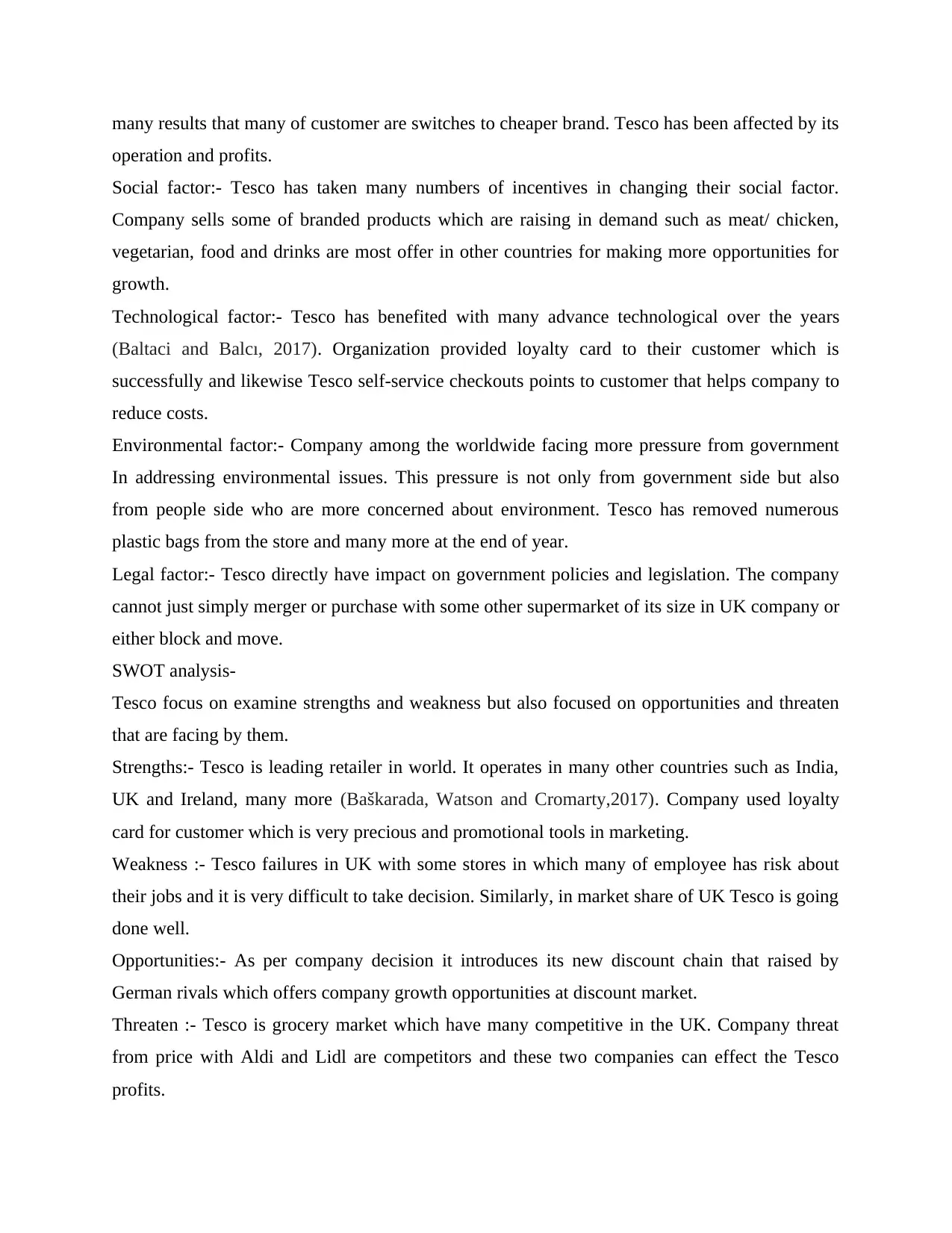
many results that many of customer are switches to cheaper brand. Tesco has been affected by its
operation and profits.
Social factor:- Tesco has taken many numbers of incentives in changing their social factor.
Company sells some of branded products which are raising in demand such as meat/ chicken,
vegetarian, food and drinks are most offer in other countries for making more opportunities for
growth.
Technological factor:- Tesco has benefited with many advance technological over the years
(Baltaci and Balcı, 2017). Organization provided loyalty card to their customer which is
successfully and likewise Tesco self-service checkouts points to customer that helps company to
reduce costs.
Environmental factor:- Company among the worldwide facing more pressure from government
In addressing environmental issues. This pressure is not only from government side but also
from people side who are more concerned about environment. Tesco has removed numerous
plastic bags from the store and many more at the end of year.
Legal factor:- Tesco directly have impact on government policies and legislation. The company
cannot just simply merger or purchase with some other supermarket of its size in UK company or
either block and move.
SWOT analysis-
Tesco focus on examine strengths and weakness but also focused on opportunities and threaten
that are facing by them.
Strengths:- Tesco is leading retailer in world. It operates in many other countries such as India,
UK and Ireland, many more (Baškarada, Watson and Cromarty,2017). Company used loyalty
card for customer which is very precious and promotional tools in marketing.
Weakness :- Tesco failures in UK with some stores in which many of employee has risk about
their jobs and it is very difficult to take decision. Similarly, in market share of UK Tesco is going
done well.
Opportunities:- As per company decision it introduces its new discount chain that raised by
German rivals which offers company growth opportunities at discount market.
Threaten :- Tesco is grocery market which have many competitive in the UK. Company threat
from price with Aldi and Lidl are competitors and these two companies can effect the Tesco
profits.
operation and profits.
Social factor:- Tesco has taken many numbers of incentives in changing their social factor.
Company sells some of branded products which are raising in demand such as meat/ chicken,
vegetarian, food and drinks are most offer in other countries for making more opportunities for
growth.
Technological factor:- Tesco has benefited with many advance technological over the years
(Baltaci and Balcı, 2017). Organization provided loyalty card to their customer which is
successfully and likewise Tesco self-service checkouts points to customer that helps company to
reduce costs.
Environmental factor:- Company among the worldwide facing more pressure from government
In addressing environmental issues. This pressure is not only from government side but also
from people side who are more concerned about environment. Tesco has removed numerous
plastic bags from the store and many more at the end of year.
Legal factor:- Tesco directly have impact on government policies and legislation. The company
cannot just simply merger or purchase with some other supermarket of its size in UK company or
either block and move.
SWOT analysis-
Tesco focus on examine strengths and weakness but also focused on opportunities and threaten
that are facing by them.
Strengths:- Tesco is leading retailer in world. It operates in many other countries such as India,
UK and Ireland, many more (Baškarada, Watson and Cromarty,2017). Company used loyalty
card for customer which is very precious and promotional tools in marketing.
Weakness :- Tesco failures in UK with some stores in which many of employee has risk about
their jobs and it is very difficult to take decision. Similarly, in market share of UK Tesco is going
done well.
Opportunities:- As per company decision it introduces its new discount chain that raised by
German rivals which offers company growth opportunities at discount market.
Threaten :- Tesco is grocery market which have many competitive in the UK. Company threat
from price with Aldi and Lidl are competitors and these two companies can effect the Tesco
profits.
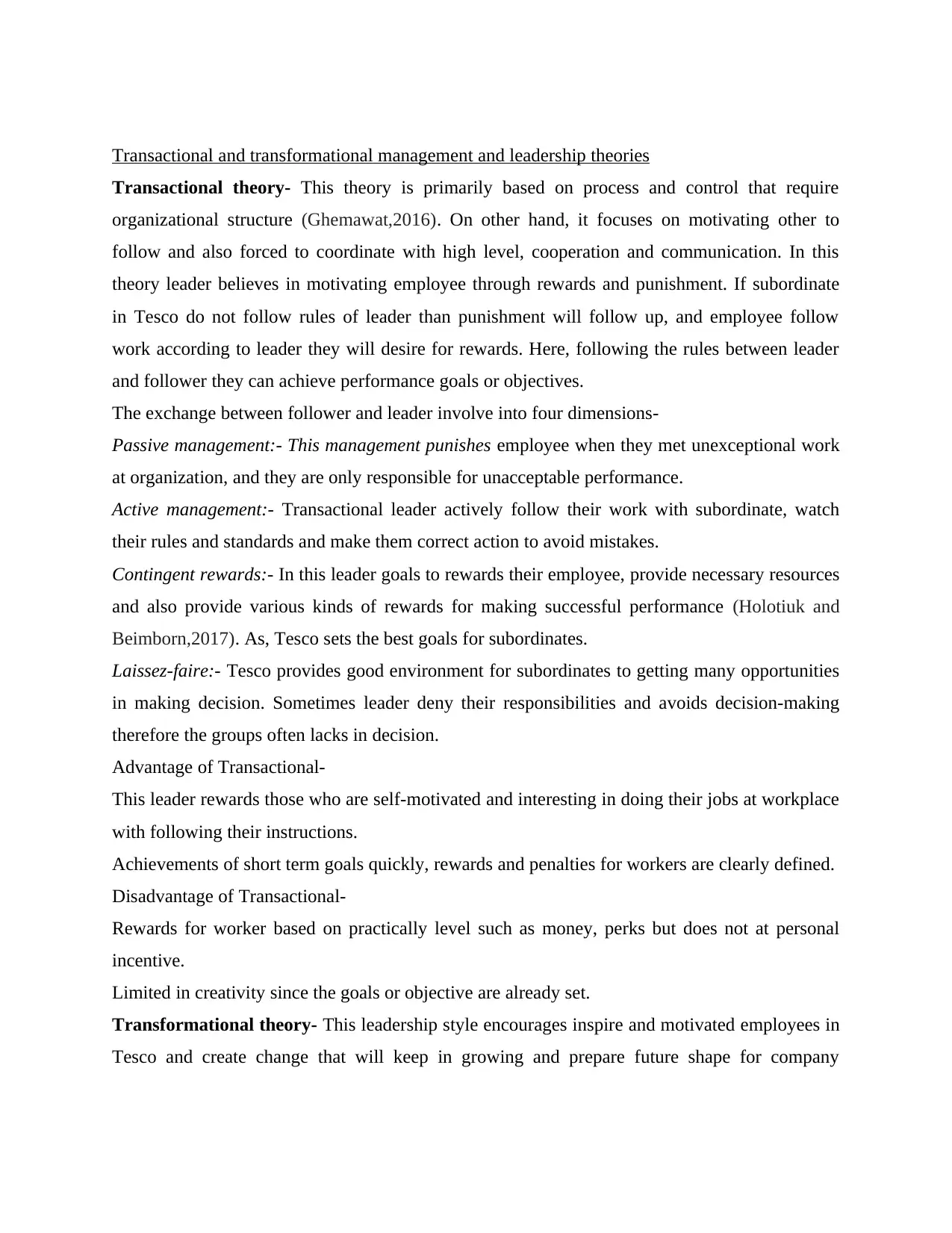
Transactional and transformational management and leadership theories
Transactional theory- This theory is primarily based on process and control that require
organizational structure (Ghemawat,2016). On other hand, it focuses on motivating other to
follow and also forced to coordinate with high level, cooperation and communication. In this
theory leader believes in motivating employee through rewards and punishment. If subordinate
in Tesco do not follow rules of leader than punishment will follow up, and employee follow
work according to leader they will desire for rewards. Here, following the rules between leader
and follower they can achieve performance goals or objectives.
The exchange between follower and leader involve into four dimensions-
Passive management:- This management punishes employee when they met unexceptional work
at organization, and they are only responsible for unacceptable performance.
Active management:- Transactional leader actively follow their work with subordinate, watch
their rules and standards and make them correct action to avoid mistakes.
Contingent rewards:- In this leader goals to rewards their employee, provide necessary resources
and also provide various kinds of rewards for making successful performance (Holotiuk and
Beimborn,2017). As, Tesco sets the best goals for subordinates.
Laissez-faire:- Tesco provides good environment for subordinates to getting many opportunities
in making decision. Sometimes leader deny their responsibilities and avoids decision-making
therefore the groups often lacks in decision.
Advantage of Transactional-
This leader rewards those who are self-motivated and interesting in doing their jobs at workplace
with following their instructions.
Achievements of short term goals quickly, rewards and penalties for workers are clearly defined.
Disadvantage of Transactional-
Rewards for worker based on practically level such as money, perks but does not at personal
incentive.
Limited in creativity since the goals or objective are already set.
Transformational theory- This leadership style encourages inspire and motivated employees in
Tesco and create change that will keep in growing and prepare future shape for company
Transactional theory- This theory is primarily based on process and control that require
organizational structure (Ghemawat,2016). On other hand, it focuses on motivating other to
follow and also forced to coordinate with high level, cooperation and communication. In this
theory leader believes in motivating employee through rewards and punishment. If subordinate
in Tesco do not follow rules of leader than punishment will follow up, and employee follow
work according to leader they will desire for rewards. Here, following the rules between leader
and follower they can achieve performance goals or objectives.
The exchange between follower and leader involve into four dimensions-
Passive management:- This management punishes employee when they met unexceptional work
at organization, and they are only responsible for unacceptable performance.
Active management:- Transactional leader actively follow their work with subordinate, watch
their rules and standards and make them correct action to avoid mistakes.
Contingent rewards:- In this leader goals to rewards their employee, provide necessary resources
and also provide various kinds of rewards for making successful performance (Holotiuk and
Beimborn,2017). As, Tesco sets the best goals for subordinates.
Laissez-faire:- Tesco provides good environment for subordinates to getting many opportunities
in making decision. Sometimes leader deny their responsibilities and avoids decision-making
therefore the groups often lacks in decision.
Advantage of Transactional-
This leader rewards those who are self-motivated and interesting in doing their jobs at workplace
with following their instructions.
Achievements of short term goals quickly, rewards and penalties for workers are clearly defined.
Disadvantage of Transactional-
Rewards for worker based on practically level such as money, perks but does not at personal
incentive.
Limited in creativity since the goals or objective are already set.
Transformational theory- This leadership style encourages inspire and motivated employees in
Tesco and create change that will keep in growing and prepare future shape for company
⊘ This is a preview!⊘
Do you want full access?
Subscribe today to unlock all pages.

Trusted by 1+ million students worldwide
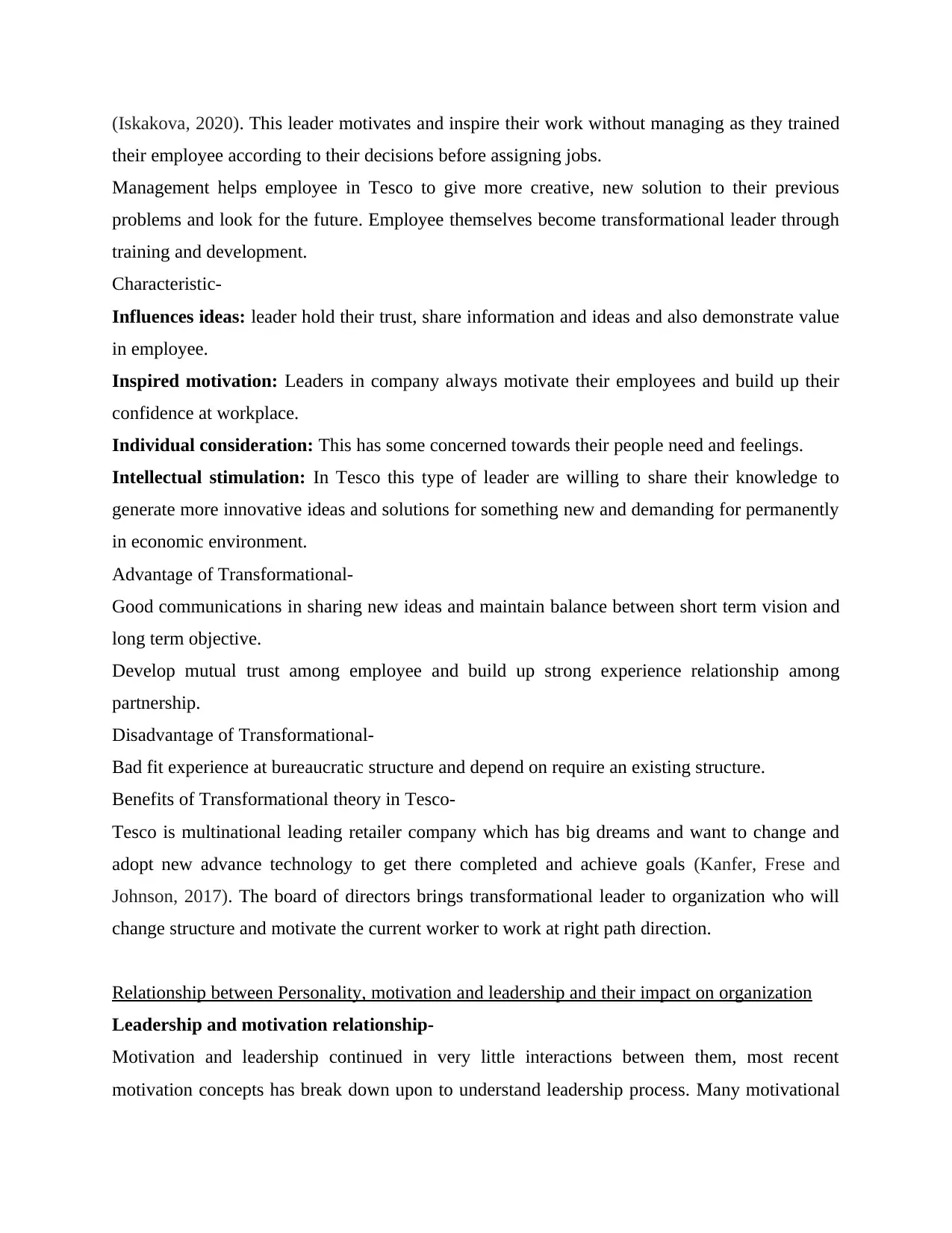
(Iskakova, 2020). This leader motivates and inspire their work without managing as they trained
their employee according to their decisions before assigning jobs.
Management helps employee in Tesco to give more creative, new solution to their previous
problems and look for the future. Employee themselves become transformational leader through
training and development.
Characteristic-
Influences ideas: leader hold their trust, share information and ideas and also demonstrate value
in employee.
Inspired motivation: Leaders in company always motivate their employees and build up their
confidence at workplace.
Individual consideration: This has some concerned towards their people need and feelings.
Intellectual stimulation: In Tesco this type of leader are willing to share their knowledge to
generate more innovative ideas and solutions for something new and demanding for permanently
in economic environment.
Advantage of Transformational-
Good communications in sharing new ideas and maintain balance between short term vision and
long term objective.
Develop mutual trust among employee and build up strong experience relationship among
partnership.
Disadvantage of Transformational-
Bad fit experience at bureaucratic structure and depend on require an existing structure.
Benefits of Transformational theory in Tesco-
Tesco is multinational leading retailer company which has big dreams and want to change and
adopt new advance technology to get there completed and achieve goals (Kanfer, Frese and
Johnson, 2017). The board of directors brings transformational leader to organization who will
change structure and motivate the current worker to work at right path direction.
Relationship between Personality, motivation and leadership and their impact on organization
Leadership and motivation relationship-
Motivation and leadership continued in very little interactions between them, most recent
motivation concepts has break down upon to understand leadership process. Many motivational
their employee according to their decisions before assigning jobs.
Management helps employee in Tesco to give more creative, new solution to their previous
problems and look for the future. Employee themselves become transformational leader through
training and development.
Characteristic-
Influences ideas: leader hold their trust, share information and ideas and also demonstrate value
in employee.
Inspired motivation: Leaders in company always motivate their employees and build up their
confidence at workplace.
Individual consideration: This has some concerned towards their people need and feelings.
Intellectual stimulation: In Tesco this type of leader are willing to share their knowledge to
generate more innovative ideas and solutions for something new and demanding for permanently
in economic environment.
Advantage of Transformational-
Good communications in sharing new ideas and maintain balance between short term vision and
long term objective.
Develop mutual trust among employee and build up strong experience relationship among
partnership.
Disadvantage of Transformational-
Bad fit experience at bureaucratic structure and depend on require an existing structure.
Benefits of Transformational theory in Tesco-
Tesco is multinational leading retailer company which has big dreams and want to change and
adopt new advance technology to get there completed and achieve goals (Kanfer, Frese and
Johnson, 2017). The board of directors brings transformational leader to organization who will
change structure and motivate the current worker to work at right path direction.
Relationship between Personality, motivation and leadership and their impact on organization
Leadership and motivation relationship-
Motivation and leadership continued in very little interactions between them, most recent
motivation concepts has break down upon to understand leadership process. Many motivational
Paraphrase This Document
Need a fresh take? Get an instant paraphrase of this document with our AI Paraphraser
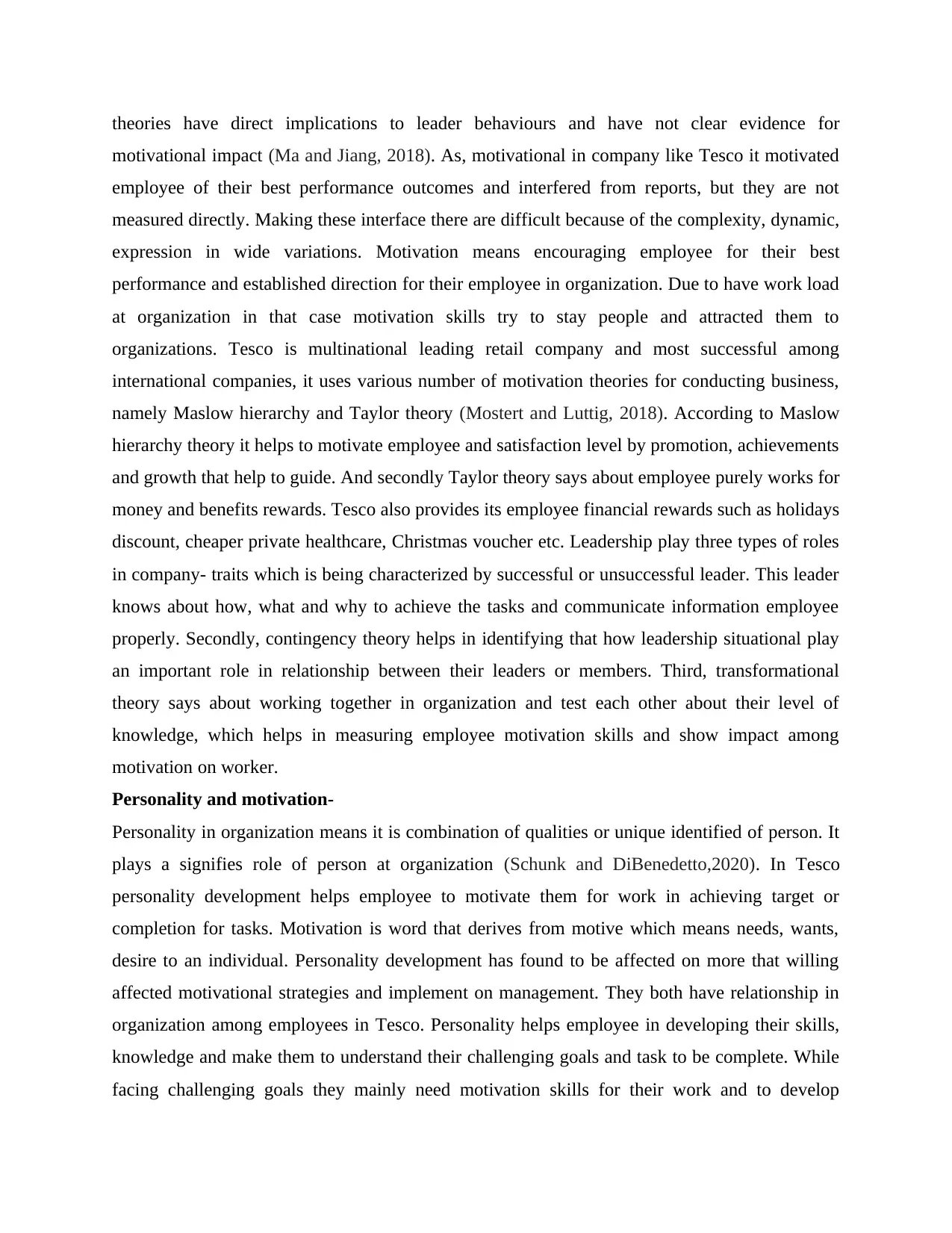
theories have direct implications to leader behaviours and have not clear evidence for
motivational impact (Ma and Jiang, 2018). As, motivational in company like Tesco it motivated
employee of their best performance outcomes and interfered from reports, but they are not
measured directly. Making these interface there are difficult because of the complexity, dynamic,
expression in wide variations. Motivation means encouraging employee for their best
performance and established direction for their employee in organization. Due to have work load
at organization in that case motivation skills try to stay people and attracted them to
organizations. Tesco is multinational leading retail company and most successful among
international companies, it uses various number of motivation theories for conducting business,
namely Maslow hierarchy and Taylor theory (Mostert and Luttig, 2018). According to Maslow
hierarchy theory it helps to motivate employee and satisfaction level by promotion, achievements
and growth that help to guide. And secondly Taylor theory says about employee purely works for
money and benefits rewards. Tesco also provides its employee financial rewards such as holidays
discount, cheaper private healthcare, Christmas voucher etc. Leadership play three types of roles
in company- traits which is being characterized by successful or unsuccessful leader. This leader
knows about how, what and why to achieve the tasks and communicate information employee
properly. Secondly, contingency theory helps in identifying that how leadership situational play
an important role in relationship between their leaders or members. Third, transformational
theory says about working together in organization and test each other about their level of
knowledge, which helps in measuring employee motivation skills and show impact among
motivation on worker.
Personality and motivation-
Personality in organization means it is combination of qualities or unique identified of person. It
plays a signifies role of person at organization (Schunk and DiBenedetto,2020). In Tesco
personality development helps employee to motivate them for work in achieving target or
completion for tasks. Motivation is word that derives from motive which means needs, wants,
desire to an individual. Personality development has found to be affected on more that willing
affected motivational strategies and implement on management. They both have relationship in
organization among employees in Tesco. Personality helps employee in developing their skills,
knowledge and make them to understand their challenging goals and task to be complete. While
facing challenging goals they mainly need motivation skills for their work and to develop
motivational impact (Ma and Jiang, 2018). As, motivational in company like Tesco it motivated
employee of their best performance outcomes and interfered from reports, but they are not
measured directly. Making these interface there are difficult because of the complexity, dynamic,
expression in wide variations. Motivation means encouraging employee for their best
performance and established direction for their employee in organization. Due to have work load
at organization in that case motivation skills try to stay people and attracted them to
organizations. Tesco is multinational leading retail company and most successful among
international companies, it uses various number of motivation theories for conducting business,
namely Maslow hierarchy and Taylor theory (Mostert and Luttig, 2018). According to Maslow
hierarchy theory it helps to motivate employee and satisfaction level by promotion, achievements
and growth that help to guide. And secondly Taylor theory says about employee purely works for
money and benefits rewards. Tesco also provides its employee financial rewards such as holidays
discount, cheaper private healthcare, Christmas voucher etc. Leadership play three types of roles
in company- traits which is being characterized by successful or unsuccessful leader. This leader
knows about how, what and why to achieve the tasks and communicate information employee
properly. Secondly, contingency theory helps in identifying that how leadership situational play
an important role in relationship between their leaders or members. Third, transformational
theory says about working together in organization and test each other about their level of
knowledge, which helps in measuring employee motivation skills and show impact among
motivation on worker.
Personality and motivation-
Personality in organization means it is combination of qualities or unique identified of person. It
plays a signifies role of person at organization (Schunk and DiBenedetto,2020). In Tesco
personality development helps employee to motivate them for work in achieving target or
completion for tasks. Motivation is word that derives from motive which means needs, wants,
desire to an individual. Personality development has found to be affected on more that willing
affected motivational strategies and implement on management. They both have relationship in
organization among employees in Tesco. Personality helps employee in developing their skills,
knowledge and make them to understand their challenging goals and task to be complete. While
facing challenging goals they mainly need motivation skills for their work and to develop
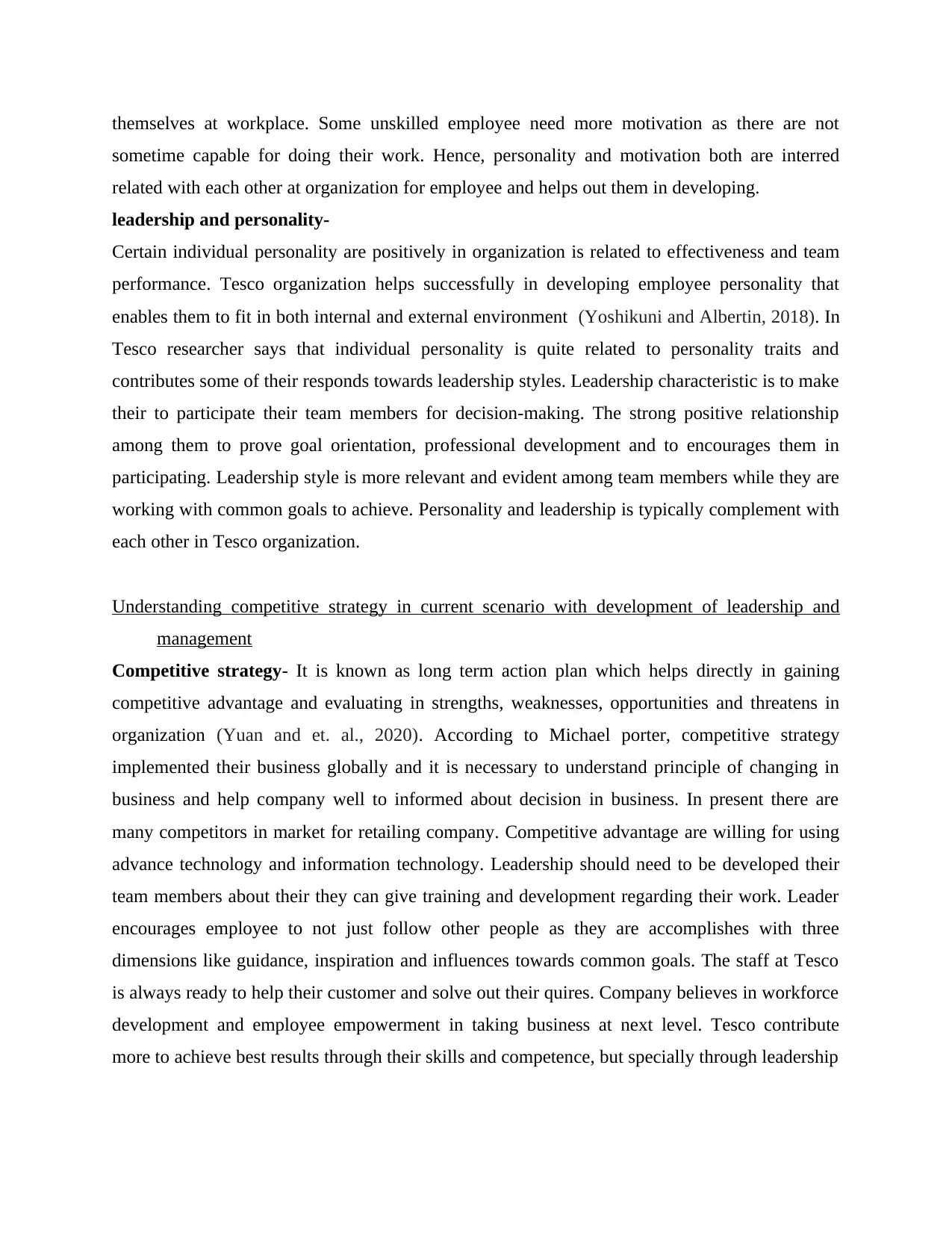
themselves at workplace. Some unskilled employee need more motivation as there are not
sometime capable for doing their work. Hence, personality and motivation both are interred
related with each other at organization for employee and helps out them in developing.
leadership and personality-
Certain individual personality are positively in organization is related to effectiveness and team
performance. Tesco organization helps successfully in developing employee personality that
enables them to fit in both internal and external environment (Yoshikuni and Albertin, 2018). In
Tesco researcher says that individual personality is quite related to personality traits and
contributes some of their responds towards leadership styles. Leadership characteristic is to make
their to participate their team members for decision-making. The strong positive relationship
among them to prove goal orientation, professional development and to encourages them in
participating. Leadership style is more relevant and evident among team members while they are
working with common goals to achieve. Personality and leadership is typically complement with
each other in Tesco organization.
Understanding competitive strategy in current scenario with development of leadership and
management
Competitive strategy- It is known as long term action plan which helps directly in gaining
competitive advantage and evaluating in strengths, weaknesses, opportunities and threatens in
organization (Yuan and et. al., 2020). According to Michael porter, competitive strategy
implemented their business globally and it is necessary to understand principle of changing in
business and help company well to informed about decision in business. In present there are
many competitors in market for retailing company. Competitive advantage are willing for using
advance technology and information technology. Leadership should need to be developed their
team members about their they can give training and development regarding their work. Leader
encourages employee to not just follow other people as they are accomplishes with three
dimensions like guidance, inspiration and influences towards common goals. The staff at Tesco
is always ready to help their customer and solve out their quires. Company believes in workforce
development and employee empowerment in taking business at next level. Tesco contribute
more to achieve best results through their skills and competence, but specially through leadership
sometime capable for doing their work. Hence, personality and motivation both are interred
related with each other at organization for employee and helps out them in developing.
leadership and personality-
Certain individual personality are positively in organization is related to effectiveness and team
performance. Tesco organization helps successfully in developing employee personality that
enables them to fit in both internal and external environment (Yoshikuni and Albertin, 2018). In
Tesco researcher says that individual personality is quite related to personality traits and
contributes some of their responds towards leadership styles. Leadership characteristic is to make
their to participate their team members for decision-making. The strong positive relationship
among them to prove goal orientation, professional development and to encourages them in
participating. Leadership style is more relevant and evident among team members while they are
working with common goals to achieve. Personality and leadership is typically complement with
each other in Tesco organization.
Understanding competitive strategy in current scenario with development of leadership and
management
Competitive strategy- It is known as long term action plan which helps directly in gaining
competitive advantage and evaluating in strengths, weaknesses, opportunities and threatens in
organization (Yuan and et. al., 2020). According to Michael porter, competitive strategy
implemented their business globally and it is necessary to understand principle of changing in
business and help company well to informed about decision in business. In present there are
many competitors in market for retailing company. Competitive advantage are willing for using
advance technology and information technology. Leadership should need to be developed their
team members about their they can give training and development regarding their work. Leader
encourages employee to not just follow other people as they are accomplishes with three
dimensions like guidance, inspiration and influences towards common goals. The staff at Tesco
is always ready to help their customer and solve out their quires. Company believes in workforce
development and employee empowerment in taking business at next level. Tesco contribute
more to achieve best results through their skills and competence, but specially through leadership
⊘ This is a preview!⊘
Do you want full access?
Subscribe today to unlock all pages.

Trusted by 1+ million students worldwide
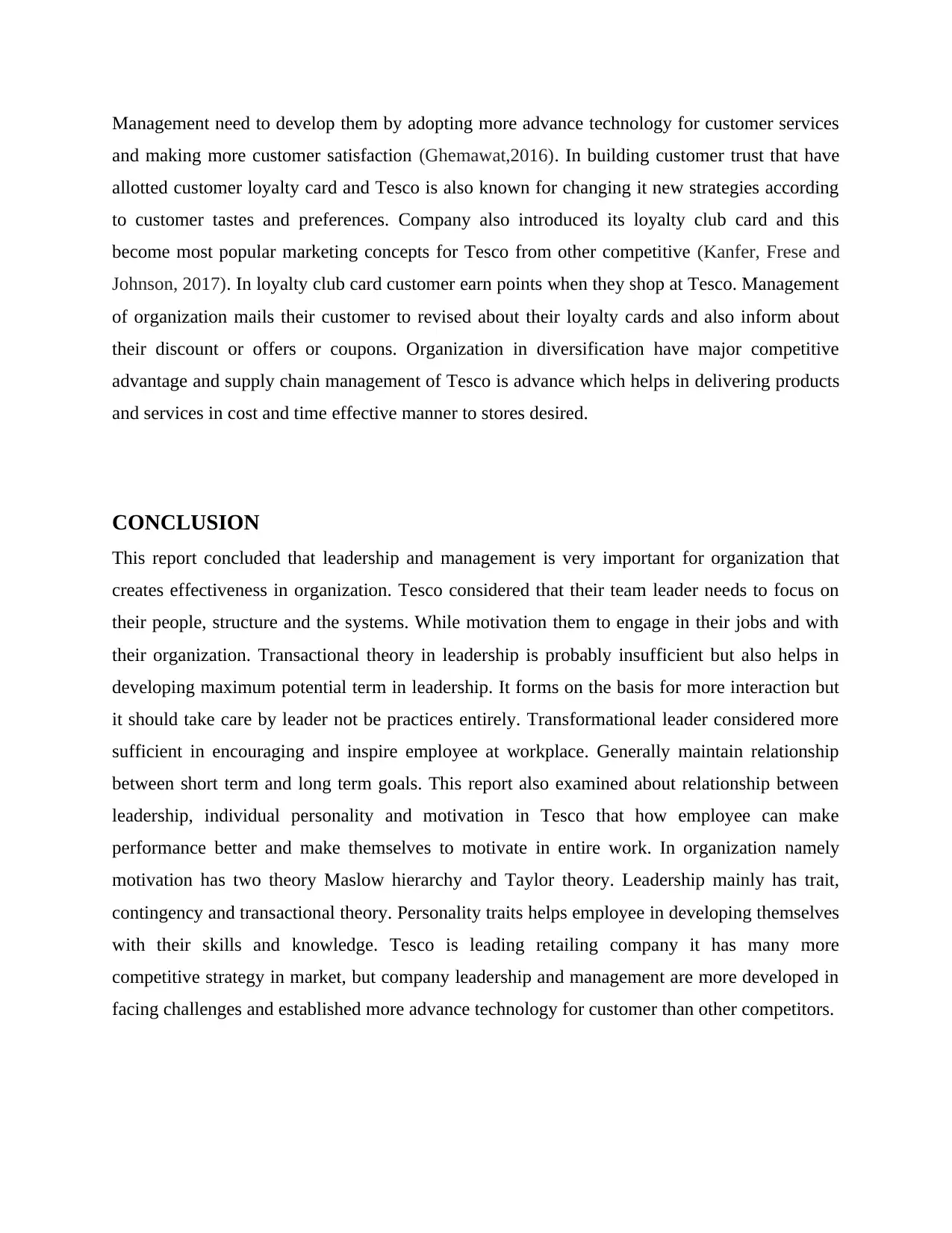
Management need to develop them by adopting more advance technology for customer services
and making more customer satisfaction (Ghemawat,2016). In building customer trust that have
allotted customer loyalty card and Tesco is also known for changing it new strategies according
to customer tastes and preferences. Company also introduced its loyalty club card and this
become most popular marketing concepts for Tesco from other competitive (Kanfer, Frese and
Johnson, 2017). In loyalty club card customer earn points when they shop at Tesco. Management
of organization mails their customer to revised about their loyalty cards and also inform about
their discount or offers or coupons. Organization in diversification have major competitive
advantage and supply chain management of Tesco is advance which helps in delivering products
and services in cost and time effective manner to stores desired.
CONCLUSION
This report concluded that leadership and management is very important for organization that
creates effectiveness in organization. Tesco considered that their team leader needs to focus on
their people, structure and the systems. While motivation them to engage in their jobs and with
their organization. Transactional theory in leadership is probably insufficient but also helps in
developing maximum potential term in leadership. It forms on the basis for more interaction but
it should take care by leader not be practices entirely. Transformational leader considered more
sufficient in encouraging and inspire employee at workplace. Generally maintain relationship
between short term and long term goals. This report also examined about relationship between
leadership, individual personality and motivation in Tesco that how employee can make
performance better and make themselves to motivate in entire work. In organization namely
motivation has two theory Maslow hierarchy and Taylor theory. Leadership mainly has trait,
contingency and transactional theory. Personality traits helps employee in developing themselves
with their skills and knowledge. Tesco is leading retailing company it has many more
competitive strategy in market, but company leadership and management are more developed in
facing challenges and established more advance technology for customer than other competitors.
and making more customer satisfaction (Ghemawat,2016). In building customer trust that have
allotted customer loyalty card and Tesco is also known for changing it new strategies according
to customer tastes and preferences. Company also introduced its loyalty club card and this
become most popular marketing concepts for Tesco from other competitive (Kanfer, Frese and
Johnson, 2017). In loyalty club card customer earn points when they shop at Tesco. Management
of organization mails their customer to revised about their loyalty cards and also inform about
their discount or offers or coupons. Organization in diversification have major competitive
advantage and supply chain management of Tesco is advance which helps in delivering products
and services in cost and time effective manner to stores desired.
CONCLUSION
This report concluded that leadership and management is very important for organization that
creates effectiveness in organization. Tesco considered that their team leader needs to focus on
their people, structure and the systems. While motivation them to engage in their jobs and with
their organization. Transactional theory in leadership is probably insufficient but also helps in
developing maximum potential term in leadership. It forms on the basis for more interaction but
it should take care by leader not be practices entirely. Transformational leader considered more
sufficient in encouraging and inspire employee at workplace. Generally maintain relationship
between short term and long term goals. This report also examined about relationship between
leadership, individual personality and motivation in Tesco that how employee can make
performance better and make themselves to motivate in entire work. In organization namely
motivation has two theory Maslow hierarchy and Taylor theory. Leadership mainly has trait,
contingency and transactional theory. Personality traits helps employee in developing themselves
with their skills and knowledge. Tesco is leading retailing company it has many more
competitive strategy in market, but company leadership and management are more developed in
facing challenges and established more advance technology for customer than other competitors.
Paraphrase This Document
Need a fresh take? Get an instant paraphrase of this document with our AI Paraphraser
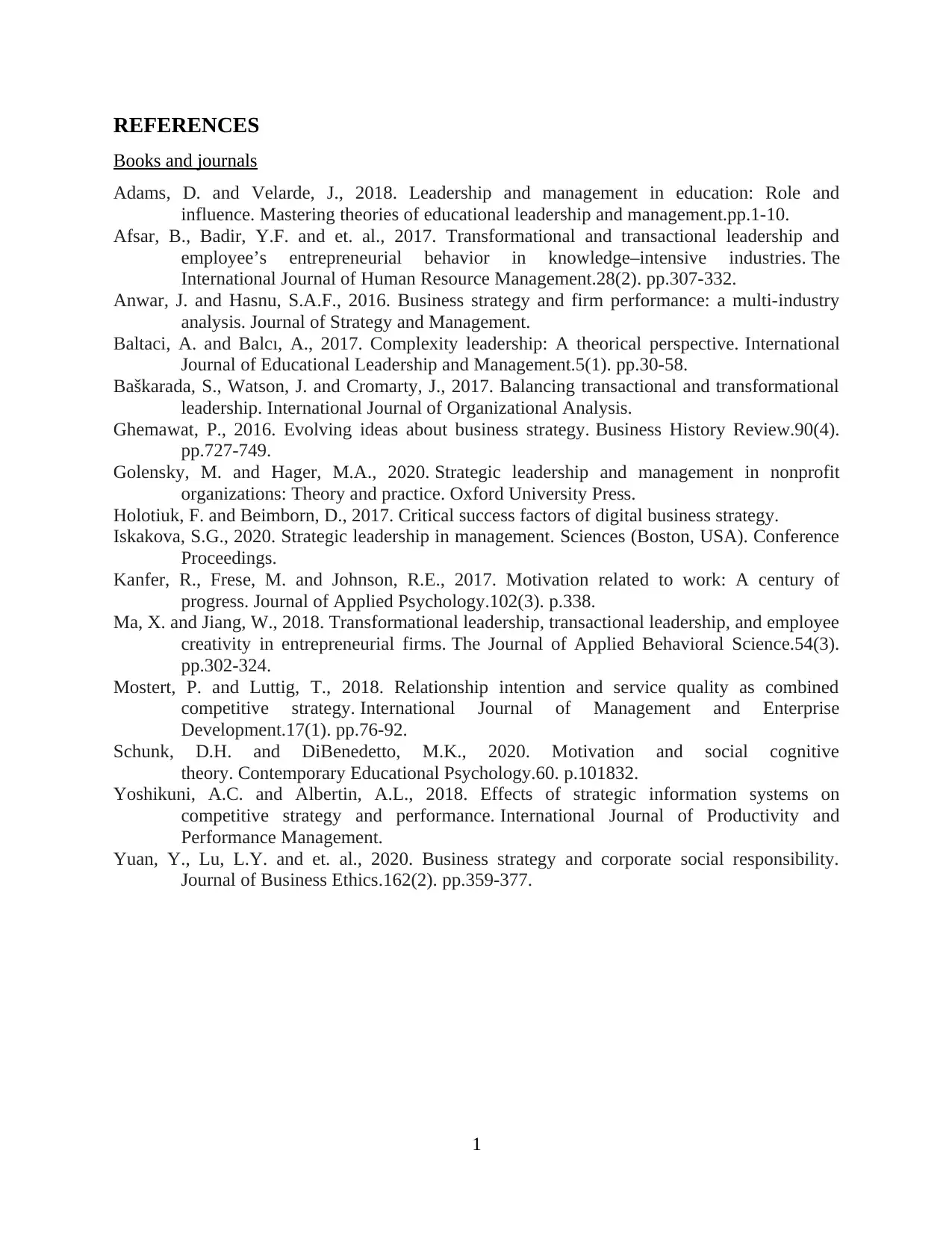
REFERENCES
Books and journals
Adams, D. and Velarde, J., 2018. Leadership and management in education: Role and
influence. Mastering theories of educational leadership and management.pp.1-10.
Afsar, B., Badir, Y.F. and et. al., 2017. Transformational and transactional leadership and
employee’s entrepreneurial behavior in knowledge–intensive industries. The
International Journal of Human Resource Management.28(2). pp.307-332.
Anwar, J. and Hasnu, S.A.F., 2016. Business strategy and firm performance: a multi-industry
analysis. Journal of Strategy and Management.
Baltaci, A. and Balcı, A., 2017. Complexity leadership: A theorical perspective. International
Journal of Educational Leadership and Management.5(1). pp.30-58.
Baškarada, S., Watson, J. and Cromarty, J., 2017. Balancing transactional and transformational
leadership. International Journal of Organizational Analysis.
Ghemawat, P., 2016. Evolving ideas about business strategy. Business History Review.90(4).
pp.727-749.
Golensky, M. and Hager, M.A., 2020. Strategic leadership and management in nonprofit
organizations: Theory and practice. Oxford University Press.
Holotiuk, F. and Beimborn, D., 2017. Critical success factors of digital business strategy.
Iskakova, S.G., 2020. Strategic leadership in management. Sciences (Boston, USA). Conference
Proceedings.
Kanfer, R., Frese, M. and Johnson, R.E., 2017. Motivation related to work: A century of
progress. Journal of Applied Psychology.102(3). p.338.
Ma, X. and Jiang, W., 2018. Transformational leadership, transactional leadership, and employee
creativity in entrepreneurial firms. The Journal of Applied Behavioral Science.54(3).
pp.302-324.
Mostert, P. and Luttig, T., 2018. Relationship intention and service quality as combined
competitive strategy. International Journal of Management and Enterprise
Development.17(1). pp.76-92.
Schunk, D.H. and DiBenedetto, M.K., 2020. Motivation and social cognitive
theory. Contemporary Educational Psychology.60. p.101832.
Yoshikuni, A.C. and Albertin, A.L., 2018. Effects of strategic information systems on
competitive strategy and performance. International Journal of Productivity and
Performance Management.
Yuan, Y., Lu, L.Y. and et. al., 2020. Business strategy and corporate social responsibility.
Journal of Business Ethics.162(2). pp.359-377.
1
Books and journals
Adams, D. and Velarde, J., 2018. Leadership and management in education: Role and
influence. Mastering theories of educational leadership and management.pp.1-10.
Afsar, B., Badir, Y.F. and et. al., 2017. Transformational and transactional leadership and
employee’s entrepreneurial behavior in knowledge–intensive industries. The
International Journal of Human Resource Management.28(2). pp.307-332.
Anwar, J. and Hasnu, S.A.F., 2016. Business strategy and firm performance: a multi-industry
analysis. Journal of Strategy and Management.
Baltaci, A. and Balcı, A., 2017. Complexity leadership: A theorical perspective. International
Journal of Educational Leadership and Management.5(1). pp.30-58.
Baškarada, S., Watson, J. and Cromarty, J., 2017. Balancing transactional and transformational
leadership. International Journal of Organizational Analysis.
Ghemawat, P., 2016. Evolving ideas about business strategy. Business History Review.90(4).
pp.727-749.
Golensky, M. and Hager, M.A., 2020. Strategic leadership and management in nonprofit
organizations: Theory and practice. Oxford University Press.
Holotiuk, F. and Beimborn, D., 2017. Critical success factors of digital business strategy.
Iskakova, S.G., 2020. Strategic leadership in management. Sciences (Boston, USA). Conference
Proceedings.
Kanfer, R., Frese, M. and Johnson, R.E., 2017. Motivation related to work: A century of
progress. Journal of Applied Psychology.102(3). p.338.
Ma, X. and Jiang, W., 2018. Transformational leadership, transactional leadership, and employee
creativity in entrepreneurial firms. The Journal of Applied Behavioral Science.54(3).
pp.302-324.
Mostert, P. and Luttig, T., 2018. Relationship intention and service quality as combined
competitive strategy. International Journal of Management and Enterprise
Development.17(1). pp.76-92.
Schunk, D.H. and DiBenedetto, M.K., 2020. Motivation and social cognitive
theory. Contemporary Educational Psychology.60. p.101832.
Yoshikuni, A.C. and Albertin, A.L., 2018. Effects of strategic information systems on
competitive strategy and performance. International Journal of Productivity and
Performance Management.
Yuan, Y., Lu, L.Y. and et. al., 2020. Business strategy and corporate social responsibility.
Journal of Business Ethics.162(2). pp.359-377.
1

2
⊘ This is a preview!⊘
Do you want full access?
Subscribe today to unlock all pages.

Trusted by 1+ million students worldwide
1 out of 12
Related Documents
Your All-in-One AI-Powered Toolkit for Academic Success.
+13062052269
info@desklib.com
Available 24*7 on WhatsApp / Email
![[object Object]](/_next/static/media/star-bottom.7253800d.svg)
Unlock your academic potential
Copyright © 2020–2026 A2Z Services. All Rights Reserved. Developed and managed by ZUCOL.





